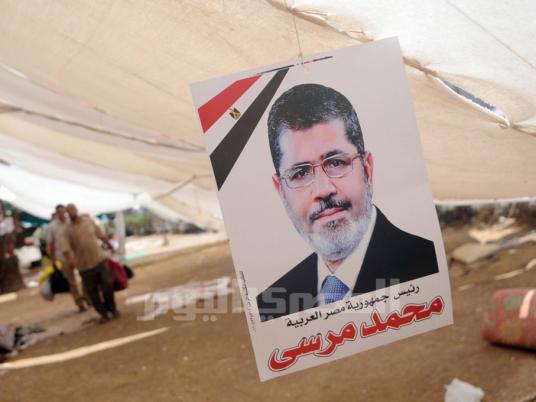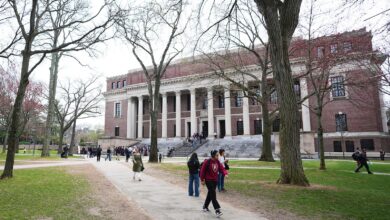
Protesters who took to the streets on Friday to decry President Mohamed Morsy and what they called the Muslim Brotherhood's control of the state have mostly been forced out of downtown, eyewitnesses say.
After a spate of fistfights and stone throwing, only pro-Morsy demonstrators remain in Tahrir and the surrounding area, say sources, as marches celebrating Morsy and the Muslim Brotherhood take place along Talaat Harb and elsewhere downtown.
Injuries have been reported. Mamdouh al-Sherbiny, director of the Tahrir Square field hospital, said that four individuals sought treatment after these minor clashes. Three had been injured by birdshots and were transferred to Qasr al-Aini hospital, he said. The other had a broken nose from being hit in the face with a stone, and received treatment at the field hospital.
The Health Ministry has denied that there were any birdshot wounds, saying that the cases referred to the hospital were suffering from bruises.
State-owned Al-Ahram newspaper reported on its website that Morsy supporters and opponents were hurling stones at each other on Talaat Harb Street off of Tahrir Square this afternoon. Al Jazeera Mubasher Masr reported that there were also fistfights between Morsy supporters and opponents in Tahrir this morning and reported that gun shots had been heard, but no injuries were been reported.
Some witnesses reported that protesters have allegedly caught the man who shot gunfire in the air and handed him over to the police. The incident caused traffic irregularities and panicked some protesters.
Earlier in the day, a 20-year-old man who was allegedly carrying a gun was also arrested in the vicinity by anti-Brotherhood protesters and locked in a room near the Omar Makram Mosque.
Witnesses also reported fistfights between protesters in front of the Omar Makram Mosque off of Tahrir. Before the Friday prayers, demonstrators in front of the mosque faced off as the president's supporters chanted, "The square says it loudly: Morsy is the president of the republic," while opponents chanted, "Down with the rule of the Supreme Guide," in reference to the Brotherhood's leader, and "Brotherhood [members] are traitors."
After these clashes, an estimated 200 Brotherhood supporters congregated in Talaat Harb Square carrying Morsy's picture and chanting in support of the Islamist group.
Anti-Morsy demonstrators slammed the low turnout at today's protests, claiming that the Brotherhood has scared people by spreading rumors of violence in the media.
Meanwhile, less than a thousand protesters marched to the presidential palace early this afternoon, followed by another march of roughly 1,000 protesters coming from Manassa to the palace around 5 pm. Eyewitnesses report that a bearded man allegedly affiliated with the Muslim Brotherhood was caught filming empty streets and squares and avoiding capturing the protesters; he is alleged to be a reporter from the independent Misr 25 channel.
Maspero Youth Union spokesperson Nader Shokry said that in the early morning, the Armed Forces closed al-Khalifa al-Ma'moun Street, which leads to the presidential palace, to prevent protesters from approaching.
Following the closure of the street, a march planned from Gamal Abdel Nasser Mosque in Qobba to the presidential palace changed its route to go down Salah Salem Street, Shokry said.
Former MP Mohamed Abou Hamed, one of the organizers of the protest, said in a statement that the Armed Forces closed down the street to prevent peaceful protesters from expressing their opinion, which is a sign of the return of a police state designed to protect the president. He recently joined the protests on Salah Salem road.
Abou Hamed addressed the protesters and told them that more were coming to joining their ranks, which would be an index of the legitimacy of their movement.
He added that although Morsy blocked the roads leading to the presidential palace, the protesters would hold their sit-in there anyway.
Shortly thereafter, state-run MENA news agency said that dozens of protesters have made their way to the area surrounding presidential palace. Demonstrators are stationed at the nearby National Bank of Egypt, in front of the barbed wire barriers installed by security forces. MENA said that protesters chanted slogans against Morsy.
In a phone interview with the Saudi-based Al-Arabiya news channel, Abou Hamed accused members of the Muslim Brotherhood of trying to disperse protesters at the presidential palace. He denied Brotherhood allegations that former presidential candidate Ahmed Shafiq was funding the protests.
Starting in the early afternoon, a protest of a few hundreds began marching from Abbasseya to Salah Salem. Protesters began arriving in Abbasseya Square this morning, holding photos of the 16 security officers recently killed in the border attacks near Rafah. The organizers of the protest were urging the gathered demonstrators to remain peaceful and not to allow themselves to be provoked.
Witnesses report that there has been strong women participation in the protests, with many leading the chants.
Nesreen Mohamed told Egypt Independent that she came to the protest to voice her rejection of the Brotherhood’s control over the state, and slammed what she described as the MB’s crackdown on freedom of expression.
Amazeeghi activist Amani al-Weshahy, also present at Abbasseya Square, said that she was there to protest the formation of the current Constituent Assembly tasked with writing the new constitution, and to demand a seat for Amazigh in the assembly.
As of this morning, military police had closed off all roads leading to the Ministry of Defense, spreading barbed wire and setting up security blockades, although no protesters have arrived yet. The move angered drivers and local residents. One passer-by told Al-Masry Al-Youm, "I can't go to work like this, why are they closing the roads when there are no protesters?"
Meanwhile, dozens have gathered at the Unknown Soldier Memorial in Nasr City, the same place where former presidential hopeful Ahmed Shafiq's supporters had staged protests during the presidential elections. According to the state TV the number of protesters is still small but also expected to grow throughout the day.
The protesters raised images for deceased presidents Gamal Abdel Nasser and Mohamed Anwar al-Sadat, as well as the recently deceased former intelligence chief, Omar Suleiman. Calm prevailed at the Unknown Soldier Memorial and the traffic went smoothly as the protesters kept to the sidewalks.
Mostafa al-Ghandour, the general coordinator of the sit-in at the Unknown Soldier Memorial, said that the protesters’ demands included dissolving the Muslim Brotherhood as well as the Constituent Assembly that is charged with drafting a new constitution. They are also calling for preserving the freedom of press, and to annul the parliamentary elections law slate system.
Three political parties, including Ghad, Tagammu and the newly conceived Hayat Al-Masriyeen, announced their participation in the protest, in addition to 15 other groups including the Maspero Youth Union, the National Association for Change and the Kefaya movement.
Marches are planned to set off from different squares including Abbasseya, Roxy, Giza, Rabaa al-Adaweya and Tahrir. Marches and protests are also planned in other governorates around Egypt.
Central Security Forces has intensified it presence at the presidential palace, alongside the Armed Forces. Osama al-Sagher, head of the Cairo Security Directorate, was present at the palace. He told Al-Masry Al-Youm that he came to supervise securing the demonstration.
Security officers have instructions not to confront protesters who were committed to peaceful demonstrating, because freedom of opinion is guaranteed to all citizens, said al-Sagher, but he added that security forces will stop any attempt to assault the palace, riot, or vandalize public or private property.




